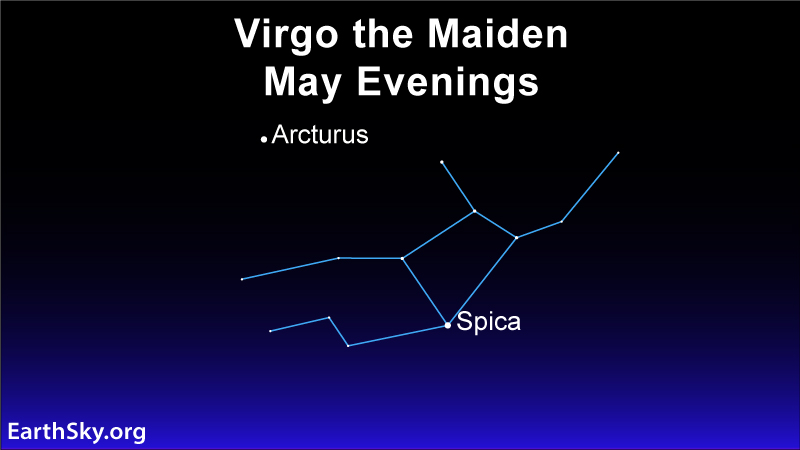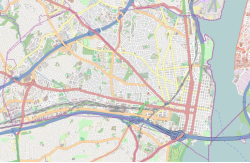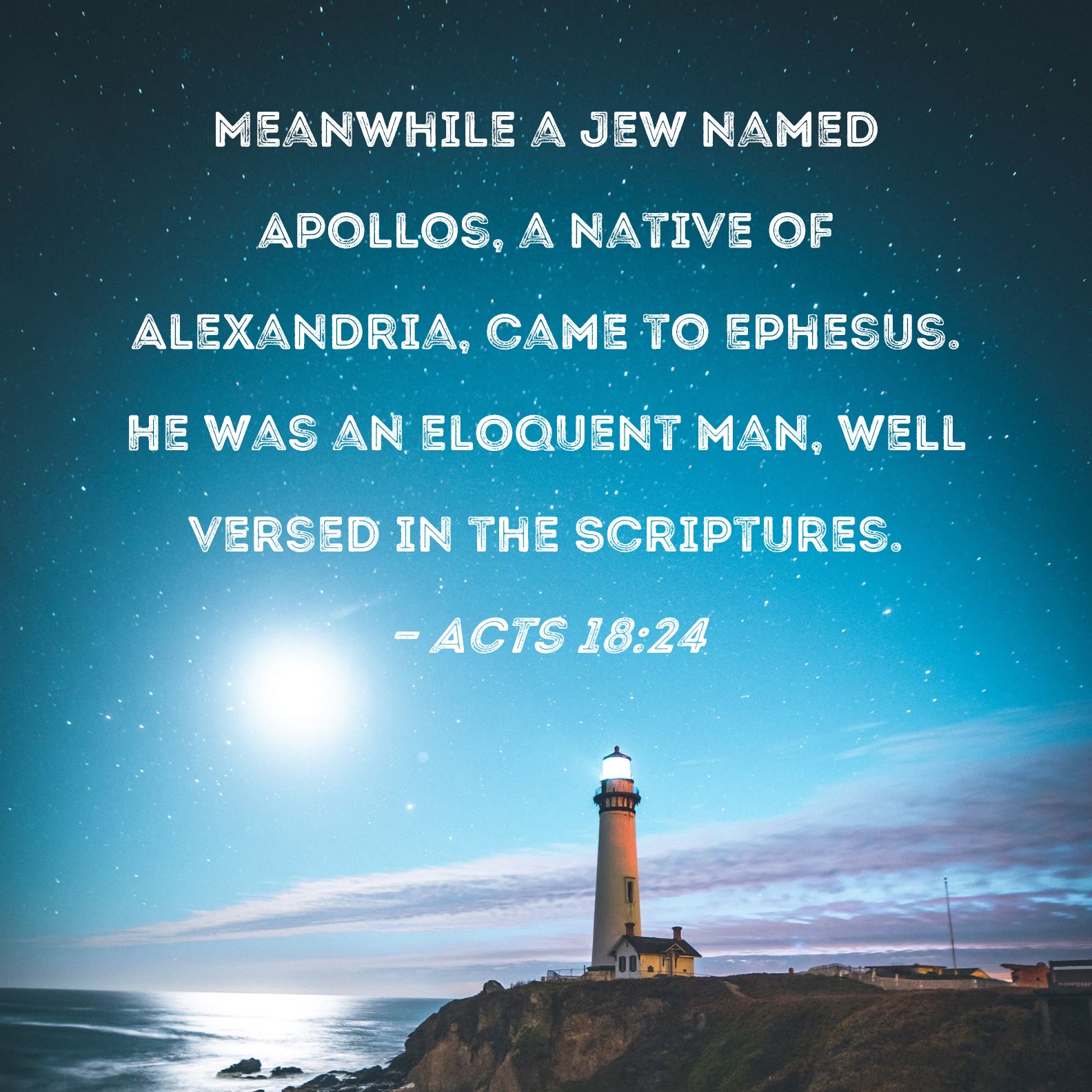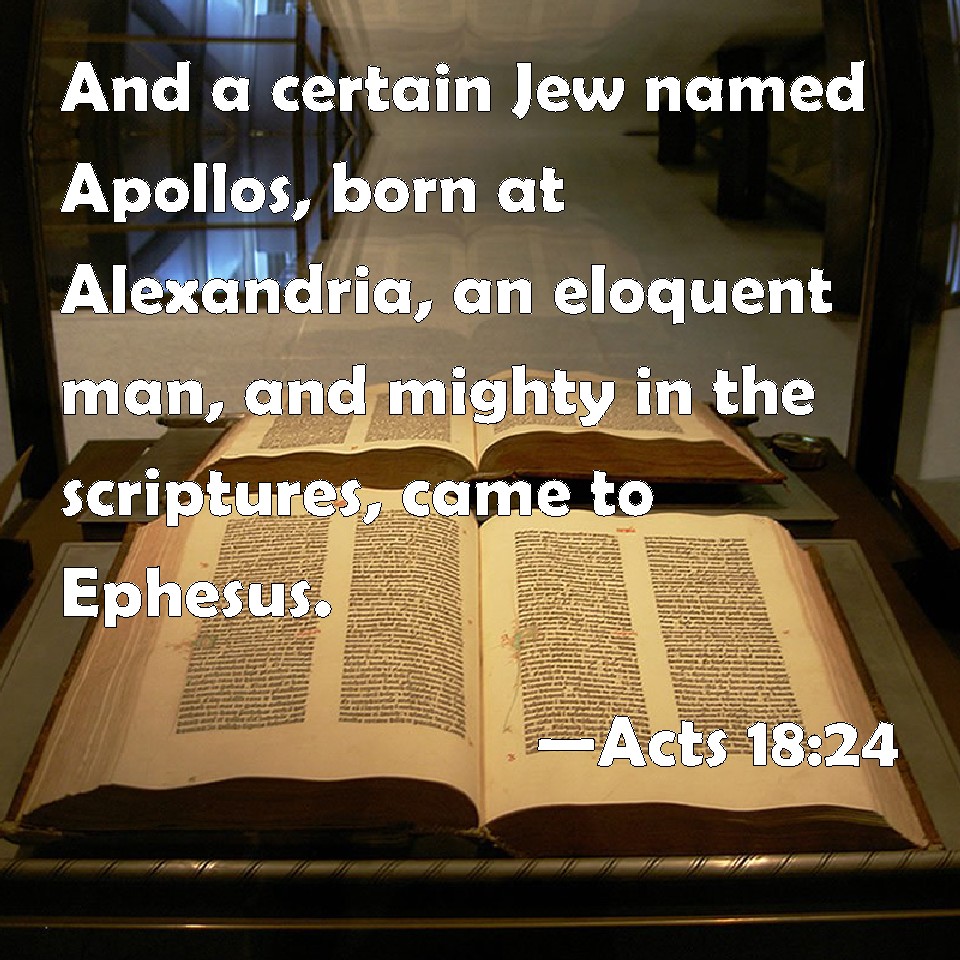|
Verse (Click for Chapter)
New International Version
Meanwhile a Jew named Apollos, a native of Alexandria, came to Ephesus. He was a learned man, with a thorough knowledge of the Scriptures. New Living Translation Meanwhile, a Jew named Apollos, an eloquent speaker who knew the Scriptures well, had arrived in Ephesus from Alexandria in Egypt. English Standard Version Now a Jew named Apollos, a native of Alexandria, came to Ephesus. He was an eloquent man, competent in the Scriptures. Berean Standard Bible Meanwhile a Jew named Apollos, a native of Alexandria, came to Ephesus. He was an eloquent man, well versed in the Scriptures. Berean Literal Bible Now a certain Jew named Apollos, a native of Alexandria, came to Ephesus, being an eloquent man, mighty in the Scriptures. King James Bible And a certain Jew named Apollos, born at Alexandria, an eloquent man, and mighty in the scriptures, came to Ephesus. New King James Version Now a certain Jew named Apollos, born at Alexandria, an eloquent man and mighty in the Scriptures, came to Ephesus. New American Standard Bible Now a Jew named Apollos, an Alexandrian by birth, an eloquent man, came to Ephesus; and he was proficient in the Scriptures. NASB 1995 Now a Jew named Apollos, an Alexandrian by birth, an eloquent man, came to Ephesus; and he was mighty in the Scriptures. NASB 1977 Now a certain Jew named Apollos, an Alexandrian by birth, an eloquent man, came to Ephesus; and he was mighty in the Scriptures. Legacy Standard Bible Now a Jew named Apollos, an Alexandrian by birth, an eloquent man, arrived at Ephesus; and he was mighty in the Scriptures. Amplified Bible Now a Jew named Apollos, a native of Alexandria, came to Ephesus. He was an eloquent and cultured man, and well versed in the [Hebrew] Scriptures. Christian Standard Bible Now a Jew named Apollos, a native Alexandrian, an eloquent man who was competent in the use of the Scriptures, arrived in Ephesus. Holman Christian Standard Bible A Jew named Apollos, a native Alexandrian, an eloquent man who was powerful in the use of the Scriptures, arrived in Ephesus. American Standard Version Now a certain Jew named Apollos, an Alexandrian by race, an eloquent man, came to Ephesus; and he was mighty in the scriptures. Contemporary English Version A Jewish man named Apollos came to Ephesus. Apollos had been born in the city of Alexandria. He was a very good speaker and knew a lot about the Scriptures. English Revised Version Now a certain Jew named Apollos, an Alexandrian by race, a learned man, came to Ephesus; and he was mighty in the scriptures. GOD'S WORD® Translation A Jew named Apollos, who had been born in Alexandria, arrived in the city of Ephesus. He was an eloquent speaker and knew how to use the Scriptures in a powerful way. Good News Translation At that time a Jew named Apollos, who had been born in Alexandria, came to Ephesus. He was an eloquent speaker and had a thorough knowledge of the Scriptures. International Standard Version Meanwhile, a Jew named Apollos arrived in Ephesus. He was a native of Alexandria, an eloquent man, and well versed in the Scriptures. Majority Standard Bible Meanwhile a Jew named Apollos, a native of Alexandria, came to Ephesus. He was an eloquent man, well versed in the Scriptures. NET Bible Now a Jew named Apollos, a native of Alexandria, arrived in Ephesus. He was an eloquent speaker, well-versed in the scriptures. New Heart English Bible Now a certain Jew named Apollos, an Alexandrian by race, an eloquent man, came to Ephesus. He was mighty in the Scriptures. Webster's Bible Translation And a certain Jew named Apollos, born at Alexandria, an eloquent man, and mighty in the scriptures, came to Ephesus. Weymouth New Testament Meanwhile a Jew named Apollos came to Ephesus. He was a native of Alexandria, a man of great learning and well versed in the Scriptures. World English Bible Now a certain Jew named Apollos, an Alexandrian by race, an eloquent man, came to Ephesus. He was mighty in the Scriptures. Literal Translations
Literal Standard VersionAnd a certain Jew, Apollos by name, an Alexandrian by birth, a man of eloquence, being mighty in the Writings, came to Ephesus; Berean Literal Bible Now a certain Jew named Apollos, a native of Alexandria, came to Ephesus, being an eloquent man, mighty in the Scriptures. Young's Literal Translation And a certain Jew, Apollos by name, an Alexandrian by birth, a man of eloquence, being mighty in the Writings, came to Ephesus, Smith's Literal Translation And a certain Jew, Apollos by name, an Alexandrian by birth, an eloquent man, arrived at Ephesus, being able in the writings. Catholic Translations
Douay-Rheims BibleNow a certain Jew, named Apollo, born at Alexandria, an eloquent man, came to Ephesus, one mighty in the scriptures. Catholic Public Domain Version Now a certain Jew named Apollo, born at Alexandria, an eloquent man who was powerful with the Scriptures, arrived at Ephesus. New American Bible A Jew named Apollos, a native of Alexandria, an eloquent speaker, arrived in Ephesus. He was an authority on the scriptures. New Revised Standard Version Now there came to Ephesus a Jew named Apollos, a native of Alexandria. He was an eloquent man, well-versed in the scriptures. Translations from Aramaic
Lamsa BibleAnd a certain Jew named A-pol’los, a native of Al-ex-an’dri-a, an eloquent man and well versed in the scriptures, came to Eph'esus. Aramaic Bible in Plain English One man, a Jew whose name was Apollo, a native of Alexandria and instructed in the word, was familiar with the Scriptures and he came to Ephesaus. NT Translations
Anderson New TestamentAnd a certain Jew, named Apollos, an Alexandrian by birth, an eloquent man, and mighty in the Scriptures, came to Ephesus. Godbey New Testament And a certain Jew, Apollos by name, an Alexandrian by race, an eloquent man, came into Ephesus, being mighty in the scriptures. Haweis New Testament Now a certain Jew named Apollos, an Alexandrian by birth, a man of eloquence, who was powerful in the Scriptures, had come to Ephesus. Mace New Testament In the mean time a Jew, nam'd Apollos, born at Alexandria, a man of letters, and vers'd in the scriptures, arriv'd at Ephesus. Weymouth New Testament Meanwhile a Jew named Apollos came to Ephesus. He was a native of Alexandria, a man of great learning and well versed in the Scriptures. Worrell New Testament Now a certain Jew, Apollos by name, an Alexandrian by birth, a learned man, came down to Ephesus; and he was mighty in the Scriptures. Worsley New Testament Now there came to Ephesus a certain Jew named Apollos, an Alexandrian by birth, an eloquent man, and mighty in the scriptures. |

Correo electrónico: |
Contraseña: |
|



 Mark Tabbert, the Director of Archives and Exhibits at the
Mark Tabbert, the Director of Archives and Exhibits at the  This episode is supported by an American Rescue Plan grant to the
This episode is supported by an American Rescue Plan grant to the  Mark Tabbert, the Director of Archives and Exhibits at the
Mark Tabbert, the Director of Archives and Exhibits at the 




